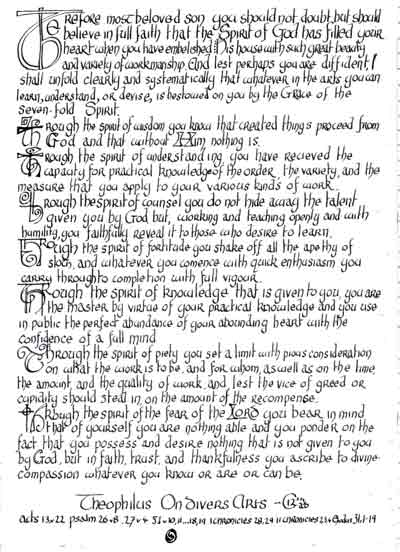Why is Craftwork Important?
I seek to enable people to access their
past and by doing this better understand their present situation and
hope for a better future.
My living history activities give people space and time to step outside
their everyday lives and experience something new in a fun and informal
atmosphere. Because this imaginative step is based on real history,
it encourages people to think critically about the assumptions made
in everyday life, whilst avoiding some of the excesses of radical alternative
living. By giving people of all ages access to the knowledge and hands
on skills required to interpret the past we hope to enable them to better
take an active part in crafting their culture.
My contemporary culture activities are inspired by an ethical indignation with the status quo and the need to live as a whole person in a fractured society. My artwork tests concepts, received wisdom and techniques by combining them with new materials, ideas and everyday living. They mark the path I have made by walking as I learn the way.
Economics
The very nature of the capitalist economy works against handcrafts and personal creativity. The growth of capital depends upon outsourcing production to the most efficient and inexpensive means possible. At worst this results in mass production of T-shirts in sweatshops using child labour. At best government legislation and minimum wages combined with an ethically aware and confident consumer group will help shield workers from gross injustice. The system however, always tends to reduce people to becoming transferable units of labour, valued at a market rate for their transferable skills.
Wordsmithcrafts stands against this trend in technology based societies. We operate in a way which actively encourages people to exercise their creative side and rediscover the potential that is within every human being to shape their environment in a very practical way. This may be something simple and basic to life like learning to make fire from scratch, or it may be a more subtle, but equally essentially human, skill like learning to express a spiritual feeling through art.
Wordsmithcrafts promotes creativity at the expense of efficiency. We value the craft skill of the artisan in a world economy of mass production, and promote gracious generosity instead of the accumulation of capital.
In order to work this way, and to provide this service to all and not just the wealthy with time and money to spare, Wordsmithcrafts has to operate in a way which cannot compete economically with capitalist industry. It betrays the economic and social conditions which make it possible (through education, technological progress, and relative affluence) for it to exist.
Wordsmith crafts does this instinctively and consciously because we believe that it is important to give people the opportunity to imagine another way that things could be.And to also experience the empowerment that comes from stepping outside the system, even is only for an hour or two. We believe that this is worthwhile and will effect a slow revolution within society, spreading like an ocean wave almost imperceptibly until it interferes constructively with waves from other sources unknown to us to cause great effect.
In reading this you have been given the opportunity to become a member of the revolution. Go on, do something revolutionary like committing an act of random kindness. If you have the means and will, you could always help support the uneconomic, pseudo medieval, throwback that is craftwork by buying non commercially viable products.
Theological
There is an ancient and continuing relationship between Arts, Crafts and Religion. This doesn't mean that every religious, or even every spiritually aware, person is conscious of their artistic ability or the value of Artistic expression. Therefore, in case your experience of religion has led you to the conclusion that God doesn't value the Arts I've copied out a text from within my own Christian tradition for you. For those to whom scriptural references are important to judge the authority of a thought, relevant verses are listed at the bottom.
The text comes from a translation of an early medieval work called On Divers Arts, by a monk calling himself Theophilus. This translation is by John G Hawthorne and Cyril Stanley Smith

